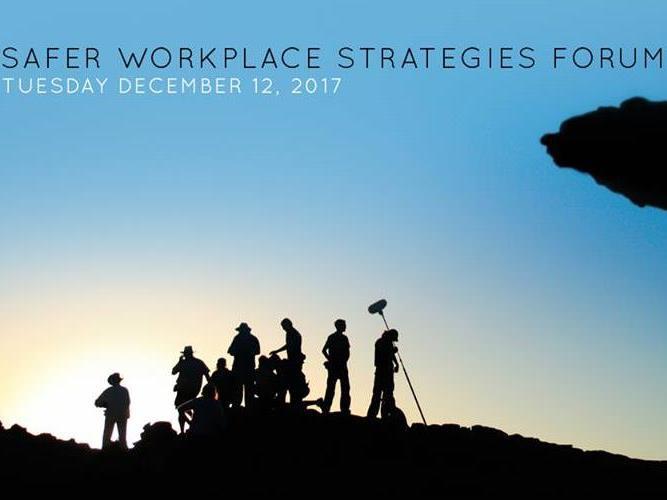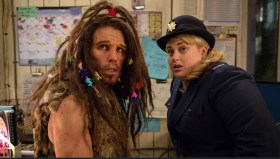Headline pic for forum from WIFT NSW Facebook.
‘There are investigative journalists who would be interested in hearing that story…’
Such was the advice given to respondents inquiring about sexual harassment reporting processes at yesterday’s Safer Workplace Strategies Forum, facilitated by WIFT NSW. Also involved were Screen Australia, Create NSW, Australian Film Television and Radio School (AFTRS), Screen Diversity and Inclusion Network, Foxtel, Screen Producers Australia, Media, Entertainment & Arts Alliance together with Rape and Domestic Violence Services Australia.
It was an important step in developing the conversation, but effective pathways to structural, industrial and cultural change remain unclear.
Zoe Angus, director of MEAA, shared early findings from its industry wide survey, due out next week. It revealed a pervasive and endemic culture of sexual harassment and discrimination in workplaces, including our top national theatre companies.
62% of performers had experienced sexual harassment and 14% had experienced ‘behaviour of a criminal nature’. However, Angus went on to assume that discrimination and assault are more pervasive in live performance, which has no statistical basis whatsoever.
Furthermore, the belief that assault is ‘most likely to be perpetrated by co-stars’ ignores the lessons of the global #metoo movement which shows the disparate economic, social and professional status of women in the screen industries and the cultural ramifications of their absence.
It all boils down to ‘abuses of power’, so succinctly put by Margaret Pomeranz in the day’s opening panel. As the deluge of international allegations shows, these outrages don’t depend on craft or sector. Instead, they correlate strongly to those with a clear and exploitable structural and industrial advantage (most commonly men). If the trends in global data are to be believed, the absence of producers, directors or high-level managers exposed within our own domestic shakedown is likely due to the infancy of the campaign, rather than non-existence.
Regardless of the figures likely to appear over the coming months, the oversight to recognise the cultural outcomes of industrial exclusion lays squarely at the feet of our state and federal funders. The audience was jubilant when Screen Australia’s Fiona Cameron’s admitted that ‘gender equity will never happen while women scale the slimy pole of sexual harassment’ but the proposed governmental salve is basic, to say the least. The Screen Australia board passed a motion to enforce a zero-tolerance code of conduct for perpetrators of sexual assault, which insists on a designated reporting officer and formal post-project reporting. ‘If the code is breached, the government should have the right to refuse further support [no more funding]’, Cameron explained, but rapping the knuckles of producers and moneymen does not attack the root of the problem; that is the over-whelming number of males in the sector.
In a move of accidental prescience, later sessions were led by Karen Willis OAM, most notable as the director of the Full Stop Foundation, and responsible for rolling out a sector-wide cultural change program within the NRL. The overlap between football and the screen industries is not lost on Professor Deb Verhoeven, who herself has applied network analysis tools to understand the culture of selecting and supporting all-male teams. Verhoeven noted wryly, ‘sectors like the film industry assume a level playing field when they claim they are merit based. And yet 30 years of evidence says the industry has in fact used a specific gender criteria as the basis for career progression. Women have to be on the field before they can score goals.’
Similarly director Kacie Anning, addressing the later panel, voiced the rumbling concern of the female-dominated audience, ‘Given that most of us here are women, how do we make men listen?’
That question is yet to be answered, so the full onus is left on women to report assault, even though we know ‘troublemakers’ can be easily punished by exclusion or termination, as evidenced in the case of Channel Seven journalist Amy Taeuber.
Furthermore, the mechanisms and processes favoured in corporate environments fail to address the unique challenges within a sector largely dominated by freelance or contract-based engagements. According to Louise Rumble, workplace health and safety special counsel at Holding Redlich, a quarter of the women who do report misconduct end up ‘worse off than before’, even within the rigid structures of full time employment.
In the creative arts, where subjective reputation is so essential, reporting can be much more personally and professionally damaging. For women in the screen sector, who are systematically overlooked and under-utilised, charging them with the burden of enacting structural change is both irresponsible and unfair. As noted within the opening Keynote by Human Rights Commissioner Kate Jenkins, ‘You don’t need to be Harvey Weinstein to slow someone’s career, just a manager.’
Whilst the Safer Workplace Strategies Forum failed to shed light on any new pathways for change, awareness of the extent of the issue is ever-growing. Meanwhile, there is a palpable sense of frustration and exhaustion among women facing the insidious by-products of gendered underrepresentation. There are so few avenues for redress.
Speaking up to the Human Rights Commission, which may not work anyway, carries no guarantee or protection from reprisal let alone effective management or consequence. Staying silent continues the suffering while perpetrators evade punishment and advance their careers. Social media remains the most pertinent and unrivalled route to turn victimhood into action.
Naming, shaming and holding the powerful to account by the faceless many, also underlines the ineffectiveness of the sector to self-identify risk or manage it without intervention. In the absence of an industry-wide HR department, whose job it would be investigate and mediate such conflicts, perhaps it is time to establish an independent body solely dedicated to the task of driving cultural change. Outside of Tracey Spicer’s inbox, that is.
—–
The whole forum has been posted on Facebook – part one; part one b; part two.





